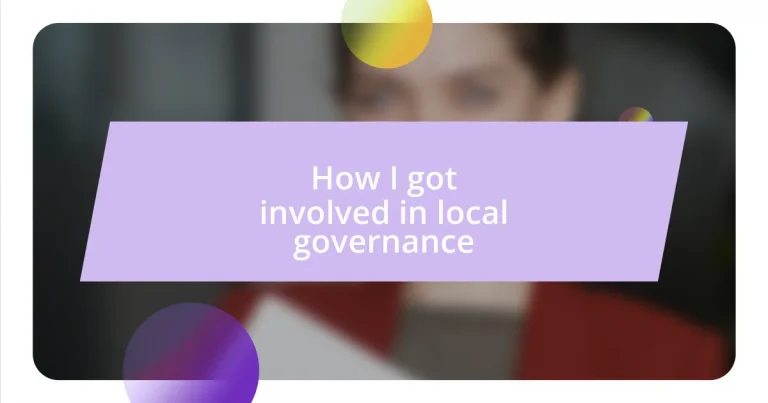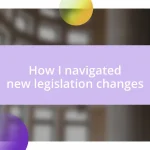Key takeaways:
- Participation in local governance allows citizens to influence community decisions, fostering a sense of empowerment and responsibility.
- Building relationships with community leaders through consistent engagement can lead to meaningful collaboration and policy changes.
- Contributing to local initiatives enhances community bonds and provides opportunities for shared experiences that can inspire further action.
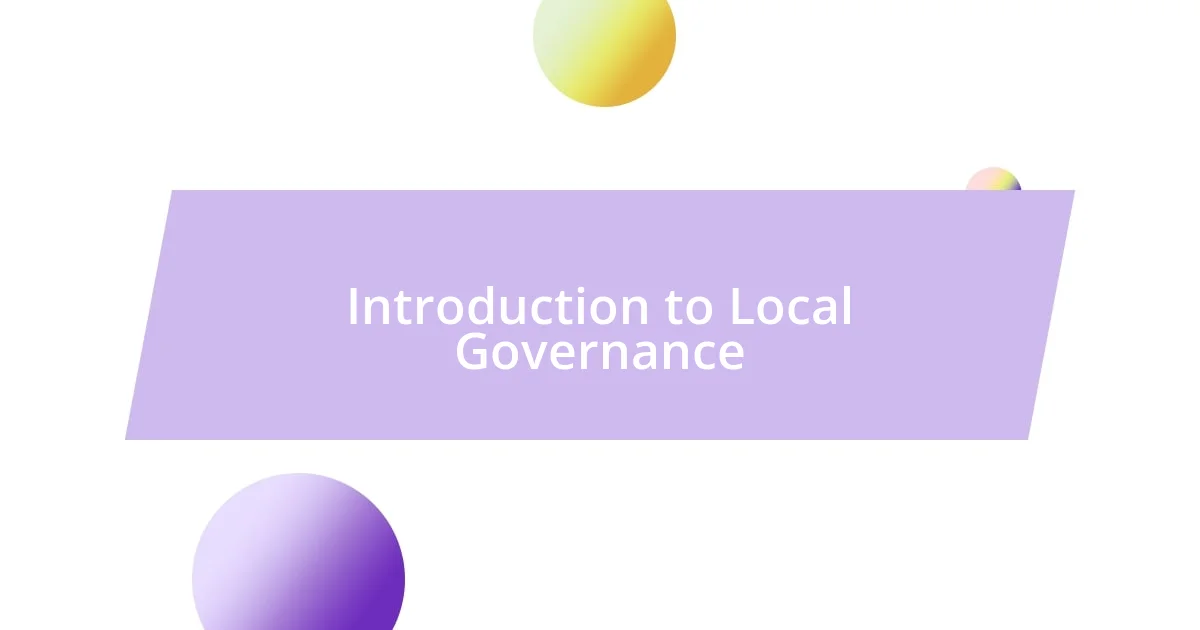
Introduction to Local Governance
Local governance is often the unsung hero of community development. It’s where citizens can directly influence the decisions that impact their daily lives. Reflecting on my own journey, I remember the sense of empowerment I felt when attending my first town hall meeting—what if we could each take a more active role in shaping our neighborhoods?
In my experience, local governance acts as a bridge between the community and larger government entities. It’s fascinating how much can change with grassroots initiatives, fueled by passionate residents ready to advocate for their local issues. I once saw a small group of neighbors band together, presenting their case for a new park at a council meeting. That moment underscored the idea that the voices of a few could resonate loudly within the community.
What’s intriguing to me is the often-overlooked impact of local governance on daily life. Decisions about traffic lights, school funding, or park maintenance may seem mundane, but they collectively contribute to the fabric of our communities. I’ve often asked myself—how many people realize that their participation can lead to tangible changes? Engaging in local governance not only fosters accountability but also establishes a deeper connection to one’s own neighborhood.
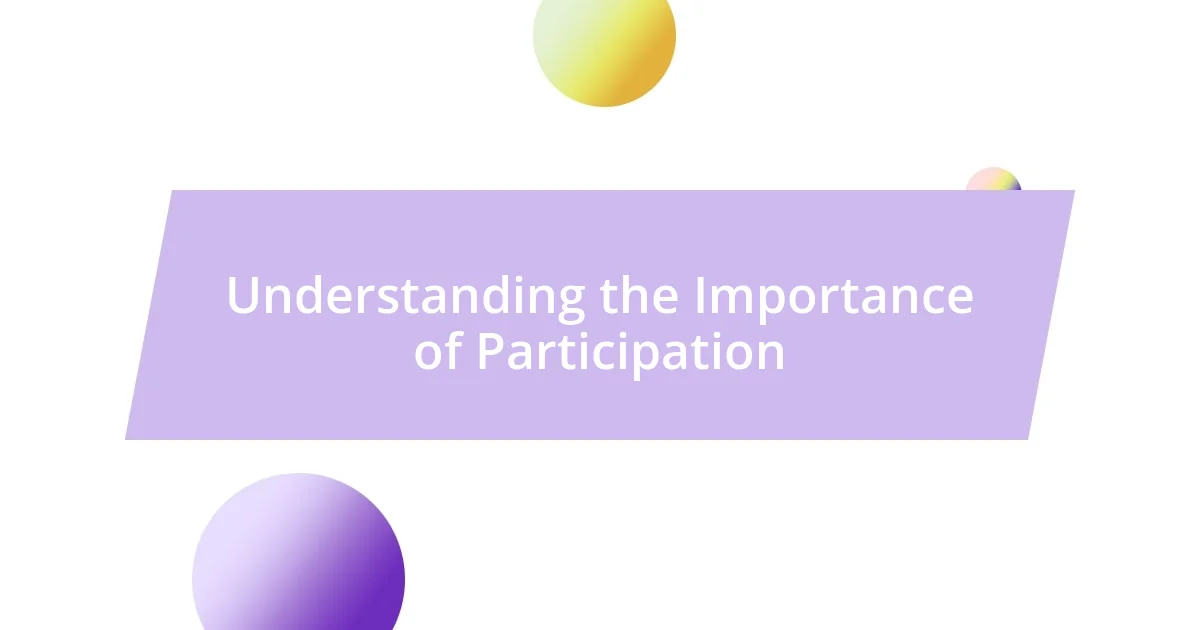
Understanding the Importance of Participation
Understanding the importance of participation in local governance cannot be overstated. When I reflect on my own journey, I think about those moments when I voiced my opinions at community meetings. I learned that even small contributions can lead to significant changes; it was nearly magical to see how a few passionate voices transformed local concerns into actionable plans. Participating isn’t just about having a say—it’s about nurturing a sense of belonging and shared investment in the community’s future.
I remember a particular event when our neighborhood faced a proposal for new housing development. I joined forces with others who shared my concerns about maintaining green spaces. As we rallied together, drafting letters and organizing discussions, I felt an exhilarating sense of unity. Our efforts culminated in a town hall presentation that made local leaders sit up and take notice. That experience taught me that participation is not just a duty; it can also be profoundly rewarding.
Moreover, I’ve come to understand that participation strengthens the foundations of democracy. When community members engage actively, it enriches decision-making processes. I’ve seen firsthand how diverse perspectives can reveal blind spots that might otherwise go unaddressed. In a recent council meeting, I was reminded of this when a newcomer shared an innovative idea for a local arts festival. It was a simple thought, but it sparked a robust discussion—showing us all the value of every single voice added to the mix.
| Type of Participation | Impact on Community |
|---|---|
| Attending Meetings | Enhances transparency and trust with local officials. |
| Volunteering for Initiatives | Promotes community spirit and collective ownership. |
| Advocating for Issues | Can lead to policy changes that directly benefit residents. |
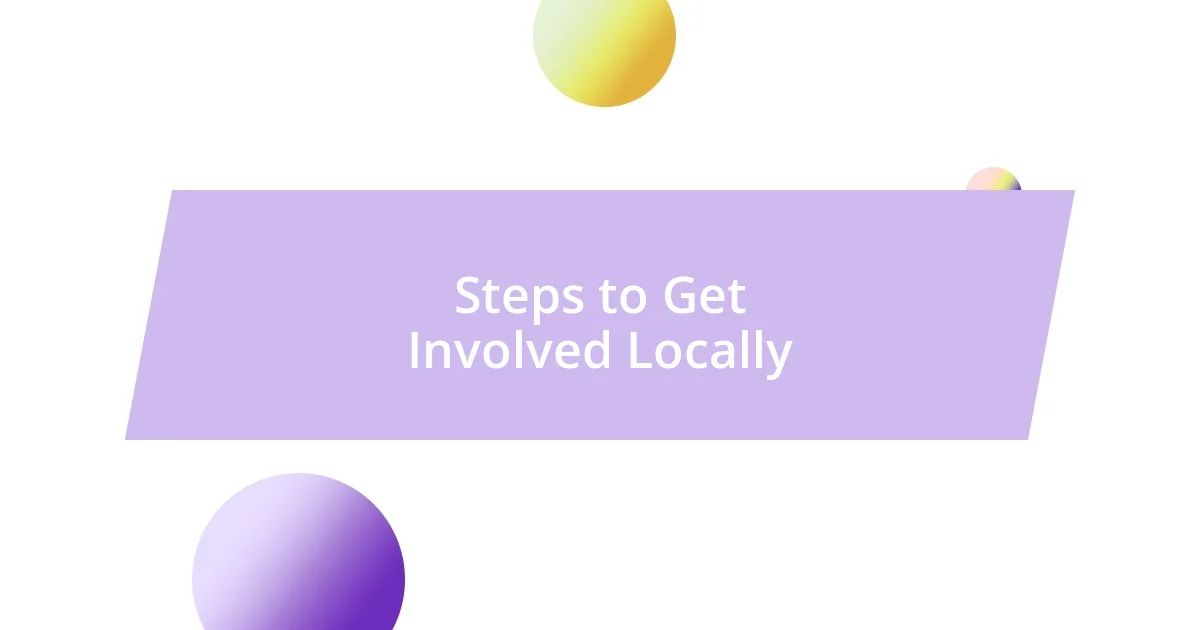
Steps to Get Involved Locally
Getting involved in local governance doesn’t have to feel overwhelming. It starts with simple steps that anyone can take. I remember when I first decided to attend a community meeting; it was just a few blocks away, yet I felt a mix of excitement and nervousness. That initial step opened doors to incredible opportunities to connect, share ideas, and influence decisions.
Here are some practical steps to start your journey in local governance:
- Research Local Issues: Familiarize yourself with the challenges and opportunities in your community. I spent hours browsing local news and reports, which helped me identify where I could contribute most effectively.
- Attend Meetings: Participating in city council or neighborhood association meetings is a great way to engage. After my first meeting, I felt more informed and inspired about my community.
- Join Local Organizations or Advocacy Groups: Connecting with like-minded individuals can amplify your impact. I joined a local environmental group, and together, we implemented community clean-ups that fostered a sense of achievement.
- Volunteer: Find volunteer opportunities that resonate with your interests. Whether it’s helping at a local school or participating in town events, I’ve found volunteering creates bonds with others who care about the community as much as I do.
- Speak Up: Don’t hesitate to voice your opinions or concerns. At one of the town hall meetings I attended, sharing my perspective on a traffic safety issue led to real discussions that aimed to find solutions.
These steps can make you feel empowered and connected to the local governance process, much like how I felt when I first engaged with my community. It’s a journey, and every small action counts!
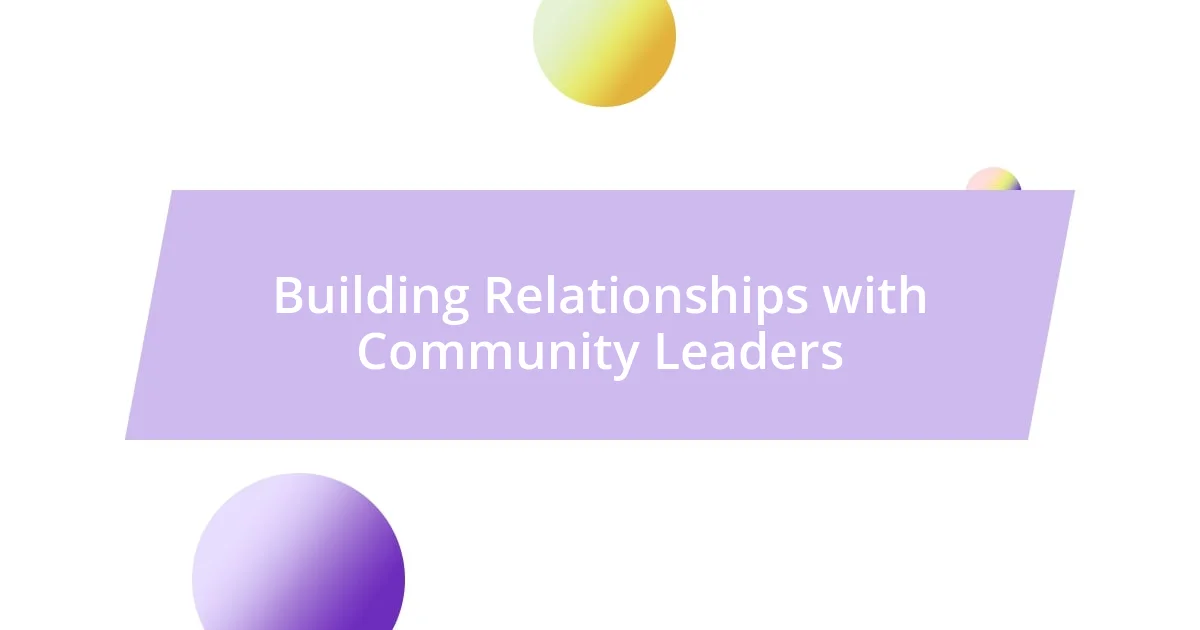
Building Relationships with Community Leaders
Building relationships with community leaders has been one of the most rewarding aspects of my engagement in local governance. I vividly remember the first time I reached out to our neighborhood association president. I was nervous but excited. What if she didn’t have time for me? To my surprise, she welcomed me with open arms, eager to discuss community challenges and ideas. That initial conversation opened so many doors—it was a reminder that leaders are often just as passionate and approachable as those they represent.
Through my experiences, I learned that creating strong connections with local leaders is not just about networking; it’s about genuine collaboration. For instance, I attended a community lunch organized by our city council member, where leaders and residents came together to share a meal and discuss pressing issues. During informal discussions, I shared a concern about park accessibility. To my delight, I received not only thoughtful feedback but also commitments to look into the matter further. It showed me the power of relationship-building—my voice, combined with that of others at the table, resonated and influenced future policies.
I often ask myself, what does it take to build trust with these leaders? The answer has been simple: consistency and transparency. Whether it’s through regular attendance at their meetings, sending them an email with feedback, or just stopping by their office to introduce myself, I found that persistence pays off. For example, I formed a small group that continued to engage with a local councilor on sustainability initiatives. Over time, we became trusted partners, which not only allowed us to present our ideas but also gave us insight into how decisions were made. Those relationships became pivotal in advancing our initiatives, reminding me that community leaders thrive on active involvement and collaboration.
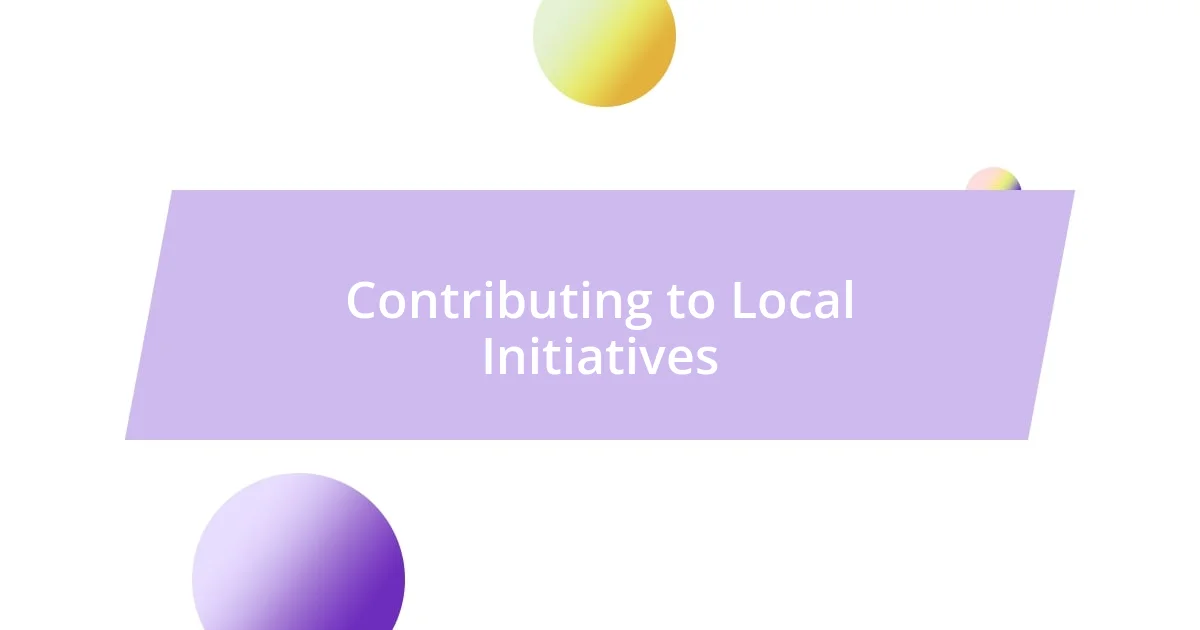
Contributing to Local Initiatives
Contributing to local initiatives can be a deeply fulfilling experience. I think back to my first volunteer day at the community garden. I arrived with my gloves on, full of enthusiasm, yet overwhelmed by the number of people and tasks before me. But as we tilled the soil together, I felt a sense of belonging and purpose, knowing we were all working toward a shared goal. That day, I learned that small contributions can lead to significant changes.
One of the most meaningful initiatives I joined was organizing a neighborhood cleanup. I remember feeling apprehensive at first, wondering if anyone would show up. To my surprise, not only did neighbors come out with their families, but we also shared laughter and stories while picking up trash. It transformed into an unexpected bonding experience, reinforcing the idea that when we unite for our community, we create connections that go beyond the task at hand. Have you ever experienced a moment when a group effort turned into something more personal? I certainly did, and it changed my perception of local involvement.
Supporting local initiatives isn’t just about rolling up your sleeves; it’s also about sparking conversations. I recall attending a forum on education where parents voiced concerns about resources in our local schools. I decided to share my experience as a former student, highlighting specific programs that worked well and those that didn’t. It was nerve-racking, but I realized my perspective could help shape future decisions. Each discussion, each story shared, has the power not just to inform but also to inspire action. This is the essence of local initiatives—everyone’s voice matters, and together, we can make a real difference.












